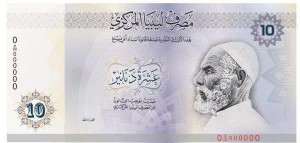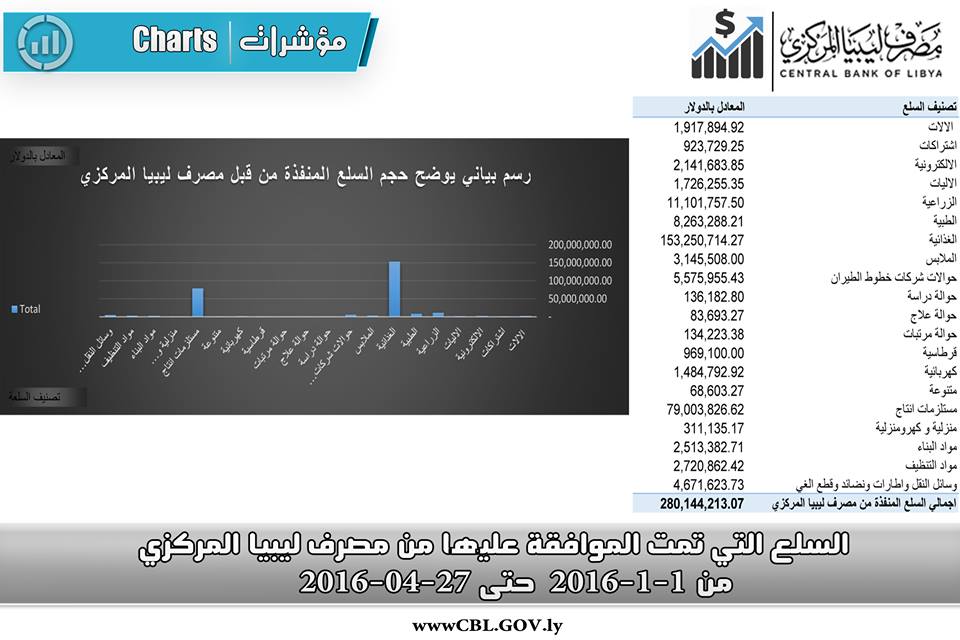By Sami Zaptia.

London, 28 April 2016:
The black market exchange rate of the Libyan dinar against the US dollar, the hard currency . . .[restrict]most exchanged by Libyans and sold by the Central Bank of Libya (CBL), has continued to rise steadily in April.
The dollar has risen from a recent low of LD 3.07 per dollar to LD 3.44 quoted today. It had stood at LD 2.70/dollar on 2nd April.
The exchange rate has been steadily rising over the last two weeks as the holy fasting month of Ramadan, which starts on 6th June (subject to lunar sighting), approaches with demand for foreign exchange increasing.
Libya Herald was told by one Tripoli-based black market money exchanger, who wanted to remain anonymous, that for a long period in March and even before, the exchange rate was affected by rumours of the impending arrival of Faiez Serraj and his Presidential Council/Government of National Accord (PC/GNA).
Upon their arrival at the Bu Sitta Naval Base the foreign exchange rate fell more as a result of the lack of supply rather than demand. Many money-sellers waited to see the effect of the PC/GNA’s arrival, he explained.
They also waited to see to what extent the CBL implemented its promises to make more FX available on the market, the amount of Libyan dinars supplied to banks as well as the number of Letters of Credit (LCs) opened, he added.
He agreed that for a period there was a kind of feel good factor as a result of the arrival of Serraj and his PC/GNA, the takeover of Ministerial buildings and the arrival to Tripoli of a stream of foreign ambassadors and Foreign Ministers, but that that soon ended as the reality of the shortage of dinars and dollars at banks and LCs being opened affected the FX rate.
The foreign currency seller said that Ramadan was a peak consumption month in Libya, like in all Moslem countries, and that demand for dollars by importers has risen in April and May as goods are brought in. He forecast that if the CBL did not actually make more dollars available in the Libyan market, either directly or through LCs, the black market rate could rise to the peaks of LD 4 plus of March.
He accepted that the PC/GNA as well as the CBL had made numerous announcements and promises to make more foreign currency available, but in reality he felt this was not happening at a fast enough pace or in enough volumes to mitigate a rise in the exchange rate before the start of the fasting month of Ramadan.
It will be recalled that Libya is going through an acute economic crises caused by its political division which has led to a military division and insecurity. This has led to a fall in its oil production and exports to only 23 percent of its peak 2012 levels of around 1.5 million barrels per day.
As Libya relies on over 95 percent of its GDP from hydrocarbons, it has been forced to deplete its foreign currency reserves to cover its budget deficits. Libya’s Audit Bureau has reported that the CBL’s foreign currency reserves have decreased by 54 percent since 2012.
This alarming rate of depletion, as well as corruption and money laundering, has forced the CBL to tighten the supply of foreign currency to the Libyan market, either directly in cash for sale at banks or in the form of LCs to importers.
It has introduced a number of new conditions on the sale of foreign currency such as the mandated use of the National ID card and withdrawal and spending limits on foreign currency transfers and debit cards.
For importers it has introduced a string of conditions on the opening of LCs such as certificates of origin, quality of goods certificates, checks on exporting companies etc.
Some Libyan businessmen have criticized these new conditions as draconian. One condition introduced by the CBL even interfered in the profit margin imposed by importers on their goods.
The net effect of these economic factors has reflected in high consumer and inflation prices hitting the consumer and the fixed and low paid most. Many staple imported consumer products, including food have doubled reflecting the black market exchange rate of the dollar. [/restrict]







